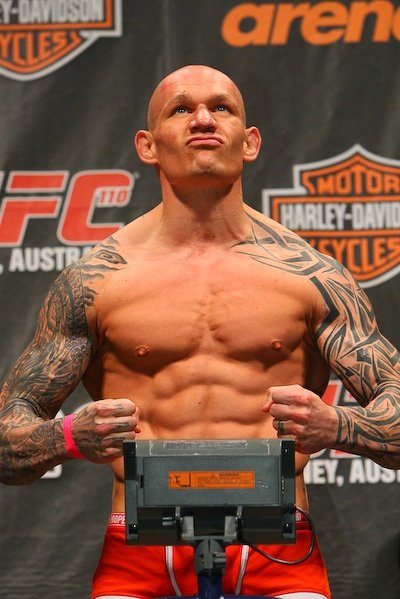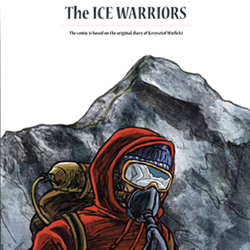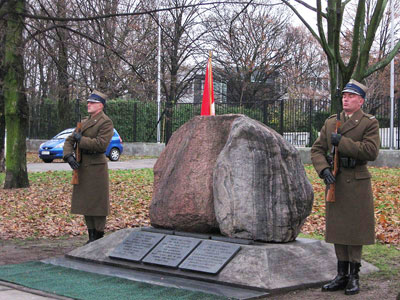 As the name implies, mixed martial arts is a name coined to describe a sport that combines a variety of fighting styles. Such combat no doubt dates back to antiquity but modern MMA probably began in the late 19th century with styles ranging from Greco-Roman wrestling to Barititsu, which first combined European and Asian fighting styles. For a long time, these matches were unregulated and featured no-holds-barred combat. In the 1970s, the mixed martial arts concept was popularized by Bruce Lee who believed that “the best fighter is not a boxer, karate or a judo man. The best fighter is someone who can adapt to any style…” Modern MMA competitions were introduced in the United States and Canada only in the last two decades, with strict rules and medical supervision of the athletes. MMA is still illegal in some American states and Canadian provinces with opponents of the sport claiming it is barbaric and dangerous, while enthusiasts claim the sport is closely regulated and results in few and minor injuries – no more than most sports and far less than, for example, boxing. In 2005, the sport was given a boost when the United States Army sanctioned mixed martial arts with championship fights held by the US Army Combatives School. When done properly, say its admirers, it is poetry in motion.
As the name implies, mixed martial arts is a name coined to describe a sport that combines a variety of fighting styles. Such combat no doubt dates back to antiquity but modern MMA probably began in the late 19th century with styles ranging from Greco-Roman wrestling to Barititsu, which first combined European and Asian fighting styles. For a long time, these matches were unregulated and featured no-holds-barred combat. In the 1970s, the mixed martial arts concept was popularized by Bruce Lee who believed that “the best fighter is not a boxer, karate or a judo man. The best fighter is someone who can adapt to any style…” Modern MMA competitions were introduced in the United States and Canada only in the last two decades, with strict rules and medical supervision of the athletes. MMA is still illegal in some American states and Canadian provinces with opponents of the sport claiming it is barbaric and dangerous, while enthusiasts claim the sport is closely regulated and results in few and minor injuries – no more than most sports and far less than, for example, boxing. In 2005, the sport was given a boost when the United States Army sanctioned mixed martial arts with championship fights held by the US Army Combatives School. When done properly, say its admirers, it is poetry in motion.
Introducing the subject to CR, our correspondent, Antoni Kowalczewski said, “Honestly, I think it is the purest form of competition and when someone does it with proper technique it borders on the beautiful. Having trained it for a little while I can say that it can best be compared to human chess. I agree that it can be violent and bloody and that is often repulsive, but seeing athletic brilliance when an equally talented competitor is trying his best to stop your every move makes it that much more impressive. To put it into more artistic terms, it would be like two master pianists, trying to play completely different improvised pieces at the same time, yet their combined effort is a beautiful song. Okay that might a bit too over the top but I think you get the idea.”
In a recent interview with one of the MMA athletes, Kowalczewski takes us behind the scenes to meet Krzysztof Soszynski, a Polish-Canadian fighter who is as tough in the ring as he is gentle in life. “MMA fighters are,” says Kowalczewski, “on average, better educated than you find in the mainstream. They are disciplined and well-trained.” Soszynski, for example, was attracted to the art and style of the martial arts, not the violence, and decries the unsanctioned matches where promoters are driven only by money and care nothing either for the style or the athletes. Kowalczewski spoke with Krzysztof Soszynski while he was training for the UFC 122 event that will take place in Germany on November 13, 2010.
AK: If MMA was a sport in the Olympics, would you represent the USA, Canada or Poland?
KS: That’s a good one. It wouldn’t be the US; I just train there and I’m not planning on becomming a citizen. I was born in Poland, raised there for 10 years and moved to Canada, and have been living here for the last 20 years. It would definitely be a toss up. I would probably … uhhh I have no idea.
AK: So it’s safe to say that it would be between Poland or Canada?
KS: Yeah, it would definitely be between Poland or Canada. To be honest, because I started MMA in Canada, and that’s where I got my base and I learned all my trade from great fighters like Joe Doerksen and Rodrigo Munduruca, who were my first instructors, I would have to say Canada. But if I had started the sport in Poland, for example if it was soccer, then I would definitely say Poland. Because I played soccer since I was 3 years old, basically since I was walking I was playing soccer; and since I played in Poland on a few school teams, I would have to say Poland. But for MMA it would be Canada.
AK: Great answer. How would you compare living and working in the USA with Canada?
KS: Just from being there for the last two years and travelling back and forth, I would say people in the States have a lot more opportunities. I would say that in terms of jobs, in terms of how quickly you can make money, how quickly you can have the things you want to have, I think the USA is a lot better. But I wouldn’t be the person that I am today if it wasn’t for being brought up and living in Canada.
AK: When you came to Canada, you didn’t know the language, you didn’t have any friends. Did you get into a lot of fights?
KS: I wasn’t in fights so much as I was bullied a lot. I was a short, stocky, chubby kid, always wearing my emotions on my sleeve. So whenever someone said something bad about me, or called me fat, or if I had the same shirt two days in a row, or if I pronounced a word wrong, I would get emotional and people would make fun of me. From the age of 11 to 13 I had a bully that would beat me up on a regular basis, he would follow me from school and beat me up. It was really tough because I didn’t know the language, my parents weren’t very well off, so everything was bought from Value Village and second hand stores, so I would wear the same clothes all the time, it made it so I got picked on a lot.
AK: Since you grew up in Poland, I assume you were brought up on a lot of heroic stories, like ‘Smok Wawelski’ (the legend of the dragon from Wawel Hill, in Krakow) or at a later age, stories about Kosciuszko (a military leader), the Warsaw Uprising, priest Popieluszko (who was murdered and became a national hero in Poland) or perhaps about members of your family. Are there some that specifically stand out? And If so, do you feel they played a part in you deciding to become a mixed martial artist?
KS: Well actually the whole MMA aspect happened by fluke. It was nothing that I had done in the past. To be honest with you, my first encounter with MMA, UFC 1 and UFC 2, was too brutal. It wasn’t for me. I got really turned off by it. Too much blood, too much gore, headbutts, punching in the groin, hair pulling, all those things, they were too much. That just wasn’t my thing. Personally, I have never been in a street fight, I had never punched anyone in the face before, then all of a sudden, I am 25 years old, I am doing some professional wrestling. I met this wrestler by the name of Bad News Brown, and he shows me a Kimura, an Armbar, and an Americana. And I get hooked on Brazillian Jiu Jitsu.
All I wanna do is get in the gym, quit wrestling and take up jiu jitsu. Six months later, I was asked if I wanted to have my first MMA fight. I had barely punched a bag or anything, but I said “sure, why not, let’s try this out”. And I got hooked immediately. So there is nothing from my childhood that made me want to become a Mixed Martial Artist, it just happened by fluke. I just kind of fell into it and gave it a 100% effort, and seven years later, here I am, proud to have worked so hard to be a mixed martial artist and to fight in the UFC.
But I do remember all the stories from Poland, I remember Smok Wawelski, those were some great stories. I’ve been back to Poland many times and just love visiting Krakow, the castles… it’s amazing.
AK: You’re very well-spoken and have a great work ethic. Why did you chose to be a prize fighter rather than a doctor or lawyer?
KS: I guess it has more to do with the way I was brought up. My dad is a very hard worker, even to this day; about 6 months ago he had a major surgery and then about 2 months ago he had a heart attack and all he wants to do is get back to work. While I was growing up, I remember how hard he would work in Huta Katowice, or when we came to Canada how he would work two jobs to provide for his family. This work ethic was instilled in me. When I started school, it was very hard to learn in a different system while at the same time learning a new language, so I didn’t do very well in school, but I was always into the physical aspects, gym classes, sports, whether it was football, baseball, soccer, I always played, I was always an athlete. Maybe I never excelled at anything, but I was always committed to it. Even when I finished high school, all of my jobs were always physical, whether it was roofing, building railroad tracks, working in banquets, I always worked physically. It wasn’t a choice. It was just something I kind of fell into, and found that I was good at it.
AK: A significant portion of your income is from sponsorships. Have you received any sponsorships from organizations/companies run by members of Polonia?
KS: I don’t receive any money from Polonia organizations, but I have done guest appearances for the Polish community here in Winnipeg. I was flown in for Polish days, to sign some autographs, talk to some kids. For me it really isn’t about money; I just want to give back. Sport gave me so much, and if it wasn’t for the fans of the sport, this sport wouldn’t exist basically. I just really enjoy talking to kids and adults who are into the sport, whether they are Polish, Canadian or of any other background. For my fans, I’m always willing to meet with them, talk to them and sign autographs.
You know there a lot of Poles here in Winnipeg who are behind me, they’re always cheering for me, and whenever there’s a pay per view on, they come out to the Polish club to cheer for me, so I definitely have a lot of support from the Polish community, not only in Winnipeg but across the country and as well in Poland. I get a lot of messages from Polish people around the world that wish me good luck and tell me how proud they are of the hard work that I have put in thus far.
AK: Do you think that there is something the Polish community could do to encourage athletes like yourself to succeed at the highest level?
KS: I think it comes down to showing support. Take a look at Mariusz Pudzianowski: everyone is behind him. No matter whom he fights, where he fights, millions of people are watching. I was watching his last fight. As long as you get behind your fighters, like Adamek, whenever there is a pay per view, I make sure I am watching and showing my support as a Pole. I think that’s all that matters. If the Polish community shows support for Polish fighters or Polish athletes, that’s enough.
AK: A test of culture is what is passed on to the next generation. What are some Polish traditions, customs, values, stories, etc… that you have tried to pass on to your son?
KS: My goal in life is to bring him to Poland one day to show him where I grew up and how I grew up. To show him that we did not have the things that he has, the TVs, the phones, the Playstations… We had to find other ways of entertaining ourselves. I also really want to show him the long tradition of where we came from and how we have become the people that we are. Through all the battles that we have fought, I definitely want to show him what happened in WWII, I want him to see Auschwitz, where I have been myself … I just want him to understand what Poland has been through and where we come from.
AK: Over the last seven years you have achieved “mainstream” status. And as Poles we all have problems with our last names, but you make it difficult for the media and general population even with your first name. Why stick so strongly to your Polish roots? Why not take the easy road and change your name to “Chris” or something similar?
KS: When I first showed up and wrote my name on the board, no one knew how to respond because no one knew how to pronounce it. So during my school years I did change it to Chris. But as soon as I got out of high school, I went back to Krzysztof. It’s my name, it’s the name that my parents gave to me, I’m proud of the name, I like the way it sounds. It’s different and unique. Especially in this country, there’s not too many Krzysztofs. Even when I met my wife, I always told her that it was Krzysztof, I don’t plan to change it and it will always be Krzysztof.
AK: You mentioned pride on a few occasions, is that something that you feel defines you?
KS: For sure, I’ve worked so hard to get to where I am. There’s not too many people that can say that at the age of 25 they found something that they’re really good at and over the course of five years have made it to the top of their sport or industry. I really take pride in how hard I work, and to show the kind of work ethic I have. There are a lot of guys who are born into the sport; take a look at Dan Henderson for example, he was basically wrestling since he was 3, he was basically born into the sport. Guys like Brock Lesnar, or some of my friends in California who are Div I wrestlers, this sport just comes so easily to them. Whereas I had to learn basically everything from scratch at the age of 25. While nowadays guys get into it even younger, at the age of 7, 8 kids have the opportunity to learn kickboxing, boxing, wrestling at the same time, whereas when I started it was just one aspect at a time. So definetly pride is very important. Nobody can ever tell me that I don’t work hard for what I do.
AK: You mentioned Dan Henderson, who has competed at the Olympic level and has been a world champion in MMA, do you get a lot of confidence knowing that you train with such a high caliber athlete?
KS: I was very fortunate with my path in MMA. When I first started, I trained under Joe Doerksen, who was one of the Canadian pioneers in MMA and one of the first mixed martial artists to come out of Canada and fight in the UFC. He took me under his wing to help me out. Then when I started to promote my own MMA shows, I met Shawn Tompkins, who is one of the best trainers in MMA, and he took me under his wing for about a year to two years. Through him, I met Bas Rutten. I lived in Bas Rutten’s house and learned from him for about 3 years. Through him, I met Randy Couture and I spent about 6 months at Randy Couture’s gym. And I also met Dan Henderson, and have spent about three years training with him. Now I’m training with Mark Munoz, Mo Lawal, Mayhem Miller, and the Nogueiras. It is just amazing how I have been able to go and learn from the best coaches while being helped along the way.
AK: All of us have hard times, but very few of us have those hard times punctuated by being punched in the face or being knocked unconscious. How do you deal with defeat?
KS: Some of my teamates, I’ve seen them completely break down and cry their eyes out after a loss, and not know what to do with themselves. I’m a little different. I know I’m not the best in this sport, I know that no matter how hard I work, I might not become the best in this sport, but for me, as long as I put in a 100% in that fight, as long as I give everything I have in that fight, no matter what the outcome of the fight is, I’m gonna go home and I’m gonna be happy about my performance. Don’t get me wrong, losing sucks. My last fight I lost, and I haven’t been able to sleep much because of it. I still dream about Stephan Bonnar and that last fight, but I know I gave it my all in that fight, and I know that if I keep doing that and if I keep training hard, everything will be right. But that’s just me.
AK: You got “Fight of the Night” for that fight, and just before that you got “Submission of the Night” on two occasions; is that a direction you want to take your career towards, becoming an entertaining fighter or is your goal still focused on becomming a world champion?
KS: I think anyone who gets into this sport dreams about being a world champion, and that is still number one on my list. Of course I would like to be one of the best fighters, but if that can’t happen, I want to be known as one of those guys whom you’re excited to watch, when you see his name on a fight card, you’re going to want to go and watch. I want to be known as one of those guys who will always put it on the line, who will always give it a 100% effort and regardless if he wins or loses you know will always be entertaining whenever he fights.
I think that will happen in my next fight as well against Goran Reljic, I think it will be a barn burner, he is going to have to put everyhing on the line because he doesn’t want to leave the UFC and everyone knows that I am capable of going toe-to-toe with anyone, so its going to be a lot of fun.
AK: Talking about preparation for your fights, do you find MMA more conducive to injuries than other sports?
KS: Just like in any other sport you are going to get injuries, whenever there is physical contact between two athletes there are always going to be injuries. For us, I find that there are more injuries in training than in the actual fight, because we are in the gym everyday, constantly sparring with each other, going 100%. Whereas in most other sports be it football, soccer or basketball, you can be gentle during practice but we have to go all out, especially in our sparring days. I find that those are the times where most injuries happen.
AK: Recently, doctors in BC have been pushing for the banning of MMA across the country. What is your take on this? And what kind of an effect would that have on your life and sport?
KS: My take on this situation is that these doctors are not very well educated on this sport. It would be nice to know what kind of studies they have reviewed. Have they studied fights? Have they studied fighters? I also think that they should speak to the commisions that are involved in Mixed Martial Arts and get their take on it. Because as a fighter I get tested every year if not two or three times a year, I get my CT scan, MRI , blood work, I get my eyes checked, I get a physical before and after each fight. There are suspensions to make sure that if we do get injured during a fight we have adequate time to recover from those injuries and get back into the sport.
However if a ban does go into effect, I think it would suck. But my wife’s and my dream is to open a MMA gym where even if I wouldn’t be able to fight again I will be able to pass on my knowledge to somebody else who could have that opportunity down the line.
AK: In such a situation, do you think that there would still be unsanctioned fights?
KS: Those are the events that are hurting the sport. It’s those promoters that don’t care about the sport, that just want to put that little extra money in their pockets, and they’re hurting the fighters; and then you can have situations with fighters not knowing if they have hepatitis fighting against each other, passing diseases back and forth, fighters fighting in shows with no medical staff, getting injured and not having a place to turn to for the help that they need. So that is the root of the problem and if we can get rid of those types of shows, I think the sport will be a lot more recognized, command a lot more respect and be viewed as a legitimate sport.
AK: To Polish fans.
KS: I’m looking forward to visiting Poland right after. My wife and I are going to take about two weeks after the fight and head over to Poland to visit some family in Krakow and Stalowa Wola. I’m looking forward to meeting a lot of the Polish MMA fans in Poland and to those of them that are coming out to Germany, for UFC 122, expect a war between myself and Goran. It’s going to be fun, I’m excited to put on a show.
CR



